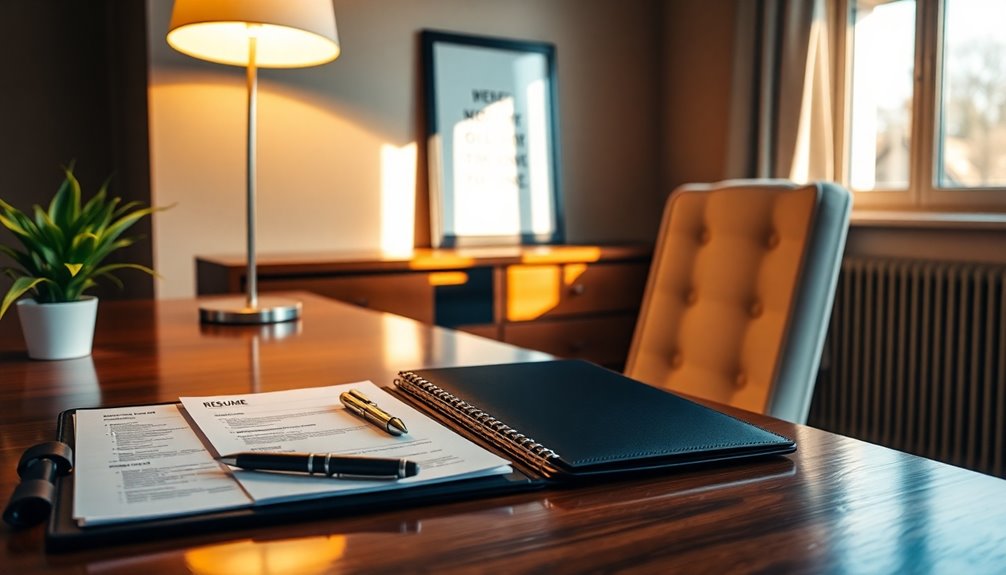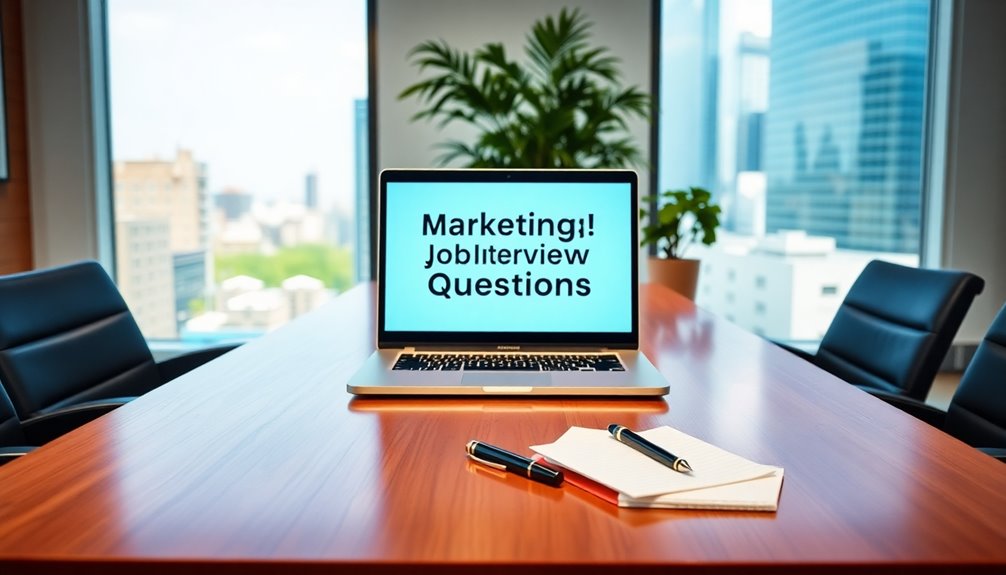Steering the interview journey means you're stepping into a series of important stages. You'll start with an initial screening, followed by scheduling an in-person interview. Prepare yourself by researching the company, practicing common questions, and dressing appropriately. Once you engage with upper management, expect deeper discussions about your fit and qualifications. If all goes well, you'll receive an official job offer, so take time to review the details carefully. Remember, every interaction shapes your chances, and there's much more to uncover about making a lasting impression throughout this journey.
Key Takeaways
- Prepare for an initial screening, which can lead to an in-person interview within a week after coordination with the hiring manager.
- Conduct thorough company research to understand its mission, values, and recent developments before the in-person interview.
- Anticipate follow-up interviews that delve deeper into your skills and fit for the role, especially for mid-level and senior positions.
- Engage with upper management by researching their backgrounds and preparing insightful questions about the organization's goals.
- Carefully review any job offer received, ensuring alignment on salary, benefits, and start date before notifying your current employer.
Understanding the Interview Timeline

How can you effectively navigate the interview timeline?
First, understand that the initial screening often leads to an in-person interview within a week. If you make it past the first contact, expect coordination with the hiring manager for scheduling.
It's wise to request time off from your current job to accommodate the interview. This timeline helps you gauge where you stand among candidates.
Keep a close eye on communication; each step indicates progress. If you're selected for an in-person interview, you'll need to prepare yourself for deeper interactions.
Preparing for the In-Person Interview

Preparing for an in-person interview requires both strategic planning and thoughtful execution. You need to be well-prepared to make a great impression.
Here are five key steps to help you get ready:
- Research the company: Understand its mission, values, and recent developments.
- Practice common questions: Rehearse answers to typical interview questions to build confidence.
- Plan your outfit: Choose professional attire that aligns with the company culture.
- Arrive early: Aim to arrive at least 10-15 minutes ahead of schedule to show punctuality.
- Prepare questions: Have thoughtful questions ready to demonstrate your interest and engagement.
Insights on Follow-Up Interviews

Follow-up interviews often play an essential role in the hiring process, especially for mid-level and senior positions.
If you've made it this far, congratulations! You've caught the employer's attention, and now it's your chance to shine even brighter.
In these interviews, expect deeper questions that aim to clarify your skills and fit for the role. This is your opportunity to showcase not just your qualifications, but also your enthusiasm for the position.
Be prepared to discuss specific experiences and how they relate to the company's goals.
Remember, the follow-up interview signals that you're a strong candidate, so take this chance to reinforce why you're the best choice for the job.
Good luck!
Engaging With Upper Management

Meeting with upper management can be a pivotal moment in your interview journey. This is your chance to showcase your skills and fit for the company culture.
To make the most of this encounter, keep these points in mind:
- Research the Leaders: Know their backgrounds and roles within the company.
- Prepare Questions: Show your interest by asking insightful questions about the organization's goals.
- Practice Your Pitch: Be ready to articulate your experiences and how they align with the company's vision.
- Dress Professionally: First impressions matter, so arrive looking polished.
- Follow-Up: Send a thank-you note expressing gratitude for the opportunity to engage.
This interaction can greatly influence the final hiring decision, so be confident and authentic! Additionally, demonstrating strong communication skills during this meeting can enhance clarity and build rapport with your potential future colleagues.
Receiving the Job Offer

Once you've navigated the interview process successfully, receiving the job offer can feel like a significant achievement.
You'll likely receive a phone call or email from the hiring manager, officially extending the offer. Take a moment to celebrate, but don't rush into a decision.
Review the offer carefully, considering salary, benefits, and start date. If you have questions or need clarification, don't hesitate to ask—this is your opportunity to confirm the role aligns with your expectations.
Once you're ready to accept, inform your current employer, usually giving two weeks' notice.
After acceptance, the company will typically set your start date two to four weeks later, allowing you to shift smoothly into your new role.
Frequently Asked Questions
What Should I Bring to an Interview?
When you head to an interview, make sure you bring several key items.
Start with extra copies of your resume, as well as a list of references.
It's also helpful to have a notepad and pen for taking notes.
Don't forget your portfolio or work samples if applicable.
Finally, carry a professional-looking folder to keep everything organized.
Dressing appropriately and being prepared can leave a strong impression on your potential employer.
How Should I Follow up After an Interview?
After your interview, it's essential to follow up promptly.
Send a thank-you email within 24 hours, expressing gratitude for the opportunity and reinforcing your interest in the position. Highlight a specific moment from the interview to make it personal.
If you haven't heard back within a week, it's okay to send a polite inquiry about your application status. This shows your enthusiasm and keeps you on their radar.
What Types of Questions Should I Ask the Interviewer?
Picture a painter, brush in hand, ready to create. When you're in an interview, asking questions is your chance to paint your understanding of the role.
You might ask about team dynamics, company culture, or success metrics. These questions show your interest and help you gauge if the job fits you.
Don't hesitate to inquire about growth opportunities, as this illustrates your ambition and desire for a long-term relationship with the company.
How Can I Assess Company Culture During Interviews?
To assess company culture during interviews, pay attention to the office environment and how employees interact.
Ask questions about team dynamics and company values. Notice if the interviewer shares personal stories about their experiences.
You can also inquire about work-life balance and employee development opportunities. Trust your instincts—if the atmosphere feels welcoming and supportive, it's a good sign.
Engaging with potential colleagues can provide further insight into the culture.
What if I Am Offered Multiple Jobs Simultaneously?
It's easy to feel overwhelmed when you receive multiple job offers simultaneously, but don't panic.
Start by evaluating each offer based on your priorities, like salary, benefits, company culture, and growth opportunities.
Talk to mentors or trusted friends for insights.
Trust your instincts—choose the one that aligns best with your career goals and values.
Conclusion
As you navigate your interview journey, remember that each step is like a chapter in your own epic tale. Embrace the challenges and triumphs, drawing inspiration from heroes who faced obstacles with resilience. With the right preparation and a confident mindset, you can turn these encounters into opportunities that lead you to your dream role. So, take a deep breath, trust your abilities, and step into this adventure—you're closer to your goal than you think!









